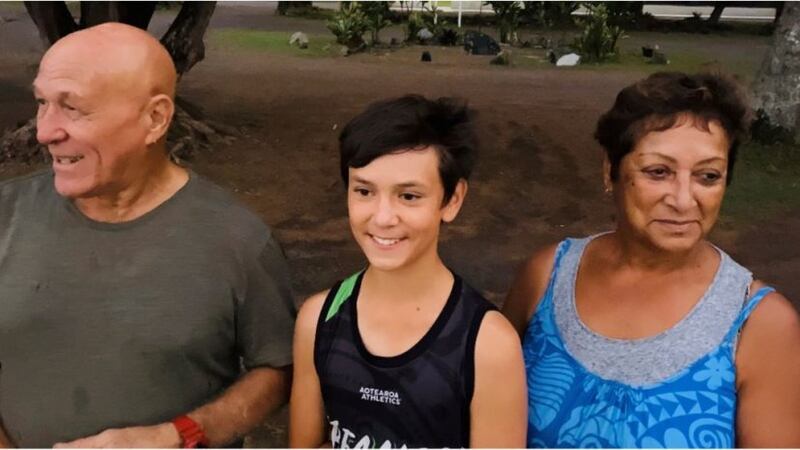A 14-year-old student from Te Kura Kaupapa Māori o Te Koutū in Rotorua, is living with his grandparents in Rarotonga for the year, to strengthen his genealogical ties and also learn his Cook Islands Māori.
Te Koha Kahurangi Henare (Ngāti Porou, Te Arawa, Ngāti Whātua ki Ōrākei, Takitumu, Puaikura Vaka), is wholeheartedly embracing his culture, under the guidance of his elders.
Henare says it was his idea to go there.
“The reason was I wanted to come here to know my Cook Islands connections, also to learn my genealogy here, also my family, ”
Grandfather Kavaia Eric Takaara Tupe Short (Takitumu Vaka) said, “We’re really enjoying having this grandson of ours here in Rarotonga. He’s full of life.”
Nana Eva Short (Ngāti Porou, Waikato, Puaikura, Takitumu Vaka) says, “To be happy in himself knowing who he is. Although he is New Zealand Māori, he is also Cook Islands Māori, he’s got both of them that he can call on.”
Loving his stay
“My daily duties are to feed the pigs, rake the litter around the house, help my nana and papa around the house, such as picking up rubbish, wash the dishes and clean my room also,” says Henare.
“The things I really enjoy are basketball, traditional performing and weaponry arts, weaving, anything to do with traditional Māori activities.”
Nana Eva says that from the age of 8 when he came over he said, "Nana I’m going to come back when I turn 12."
“And I waited, 12 went by, until early this year when we got the call, it said, “Is the invitation still open for him to come and school here?”
Henare goes to Tereora College.
“It’s a Cook Islands Māori school. You learn Cook Islands Māori language,” Henare says.
Drumming and dance
“I really want him to learn this reo because I think because he already knows New Zealand Māori that I think that it’s easy enough for him to pick it up,” says Eva.
“There are some real similarities between the two (languages) but there are also some differences,” Henare says.
Papa Eric says, “This one (Te Koha) is really wanting to come out and learn with us.
“And also the cultural side of it. Being able to mix with his family, to learn the ura, to learn the pāte, the beating of the drums,” says Eva.
Henare says playing the drums is the best.
“I am still learning maybe how to play the drum. But each day I will keep improving to a standard of excellence. The most important thing to me is learning the ura. The stance is stunning, the movements of the feet.”
Learning traditions
“Not long ago he was saying 'maybe I’ll stay for another half a year,' and we’re going what?” says Eric.
“He enjoys his school, he enjoys what he’s doing here, and now he’s learning how to feed the pigs with papa.”
Eva says It’s free-er, easy-going.
“He’s able to mingle with all his peers, with his cousins. He’s come back from school to tell me that “aw so and so, I was with my cousin today.” I said, “Which one?” He’s telling me about his cousins.”
“Meeting my family is the best, this side of the family. To learn the traditions here, my genealogy also,” says Henare.
“I am keen to bring my family from Aotearoa here to show them their family from here, to show them that the Cook Islands is the place we Māori came from.”
Where the canoes left from
“It’s really important for him to do that, to know that there are two sides to him. That he has a choice in life, that he has an option too, as he grows older to come back to make something on this side,” says Eva.
He’s got an option to do whatever he likes over in New Zealand.
“The canoes left from here and took all our ancestors to New Zealand,” says Eric.
“We are related and I think today is very important because now Māori New Zealanders are realising that this is where Awaiki is, this is where they come from.”
Eric says that when people think of in Avana, where the seven canoes left from, "we are related and we should all learn together."
“The most important things I’ll take back home with me is our genealogy, the love that has been sent from this family to our family in New Zealand,” Henare says.
“Te Koha was brought up 13 years as Māori Niu Tireni," says Eric.
“He’s always known his nana and papa as from Rarotonga but now he’s living it.”
Eva says her mokopuna hasn’t been to church yet, which is part of living here, and hopes before his time is up, Papa will encourage Te Koha to go along with him.

